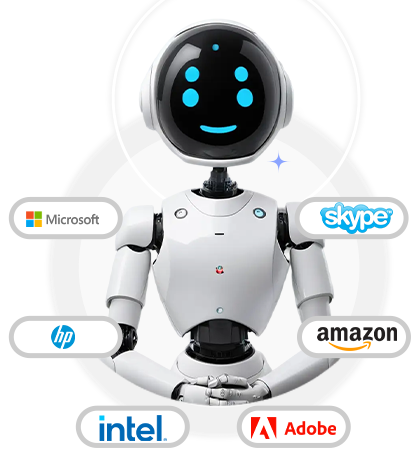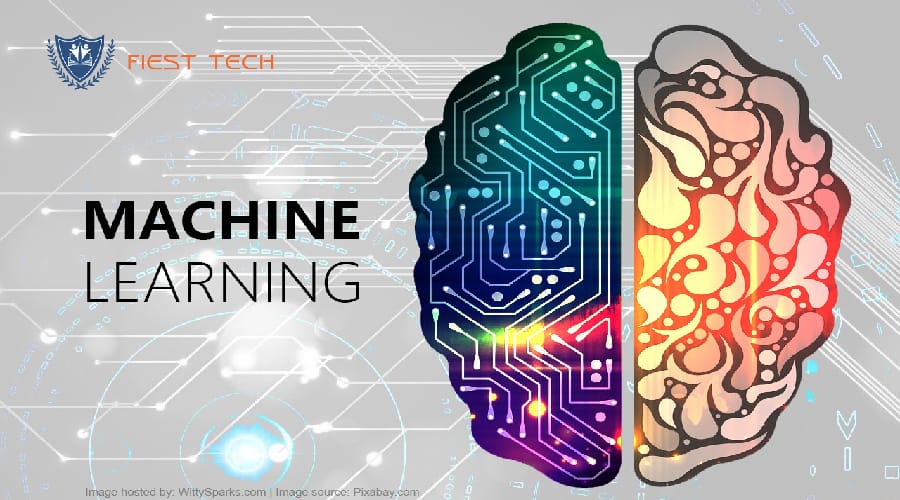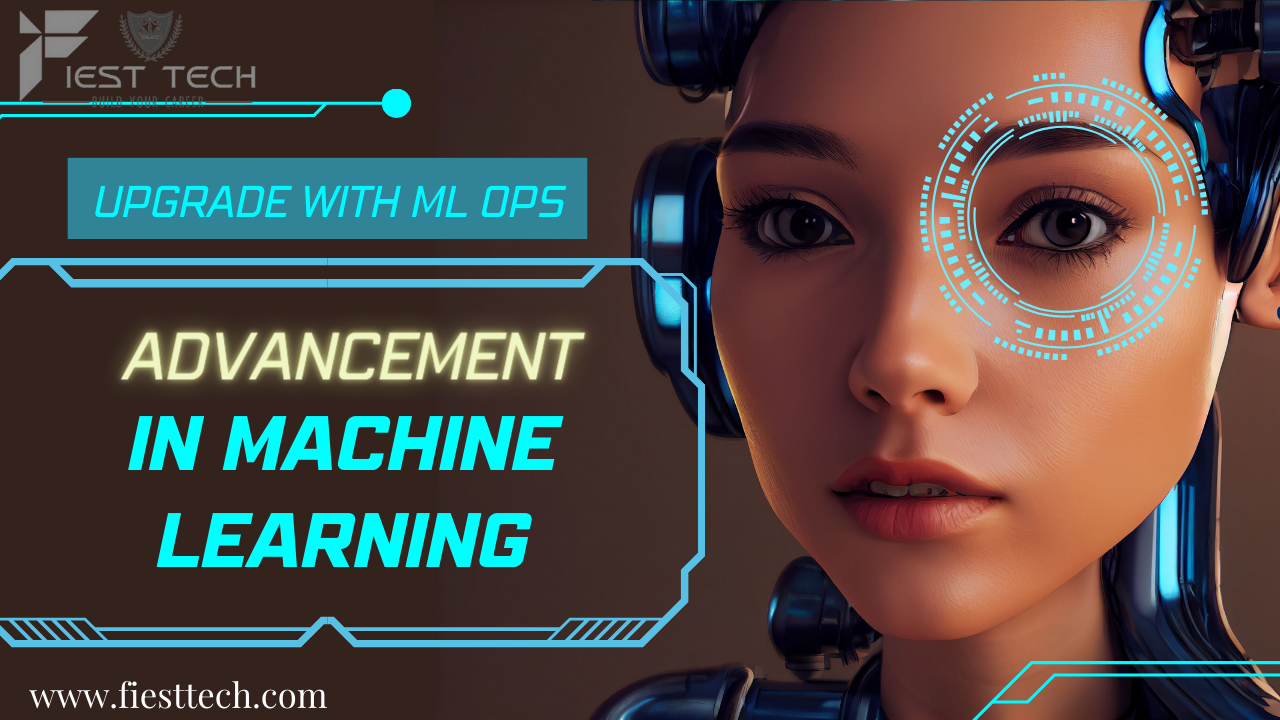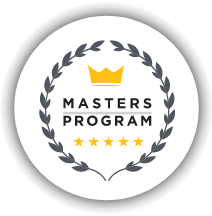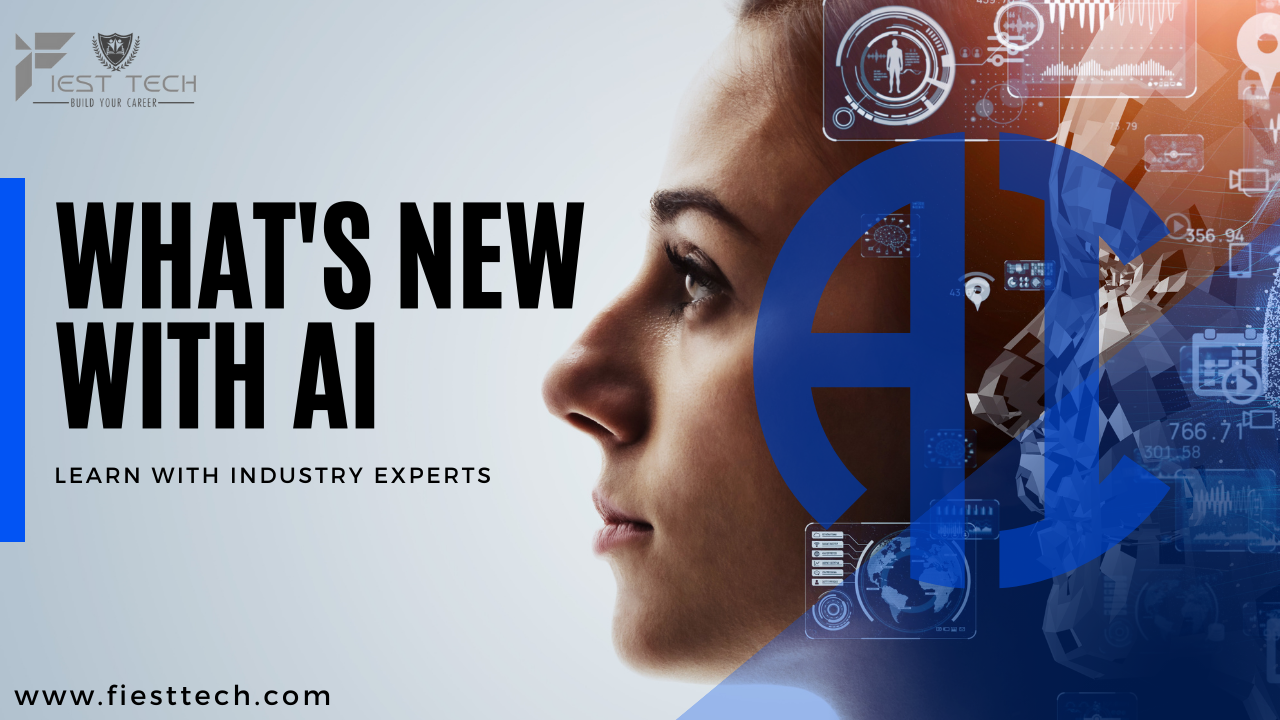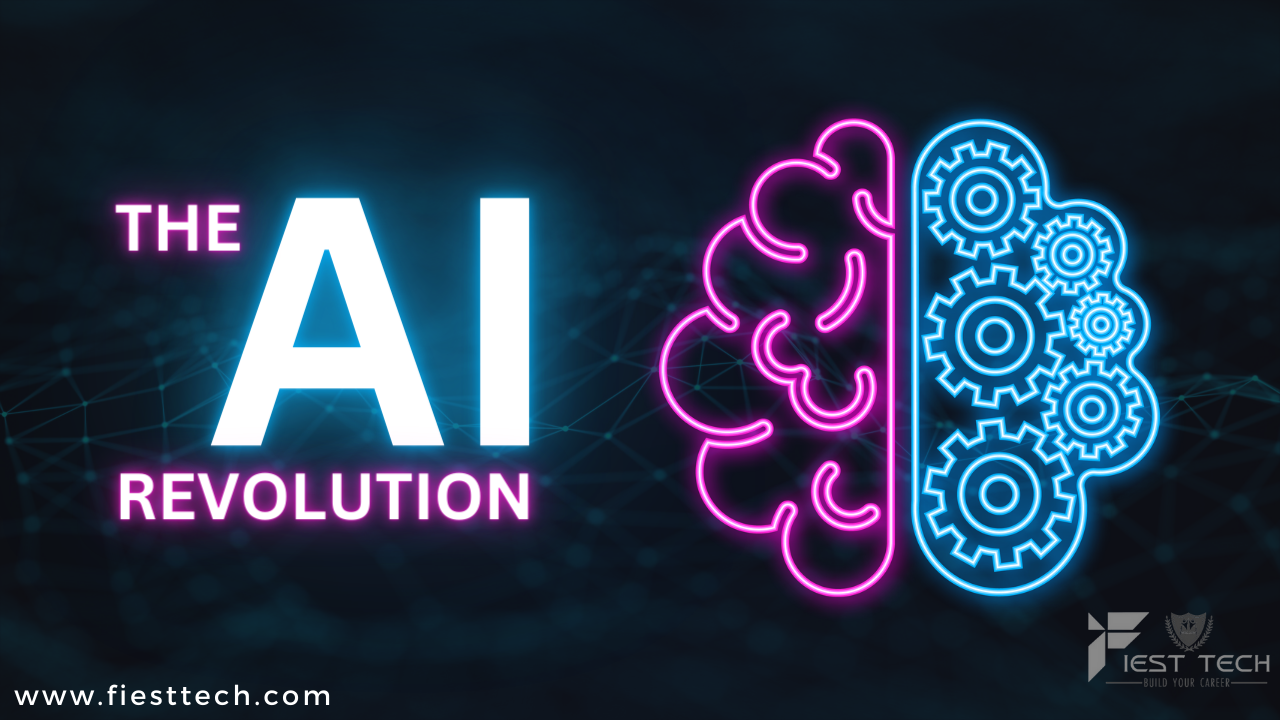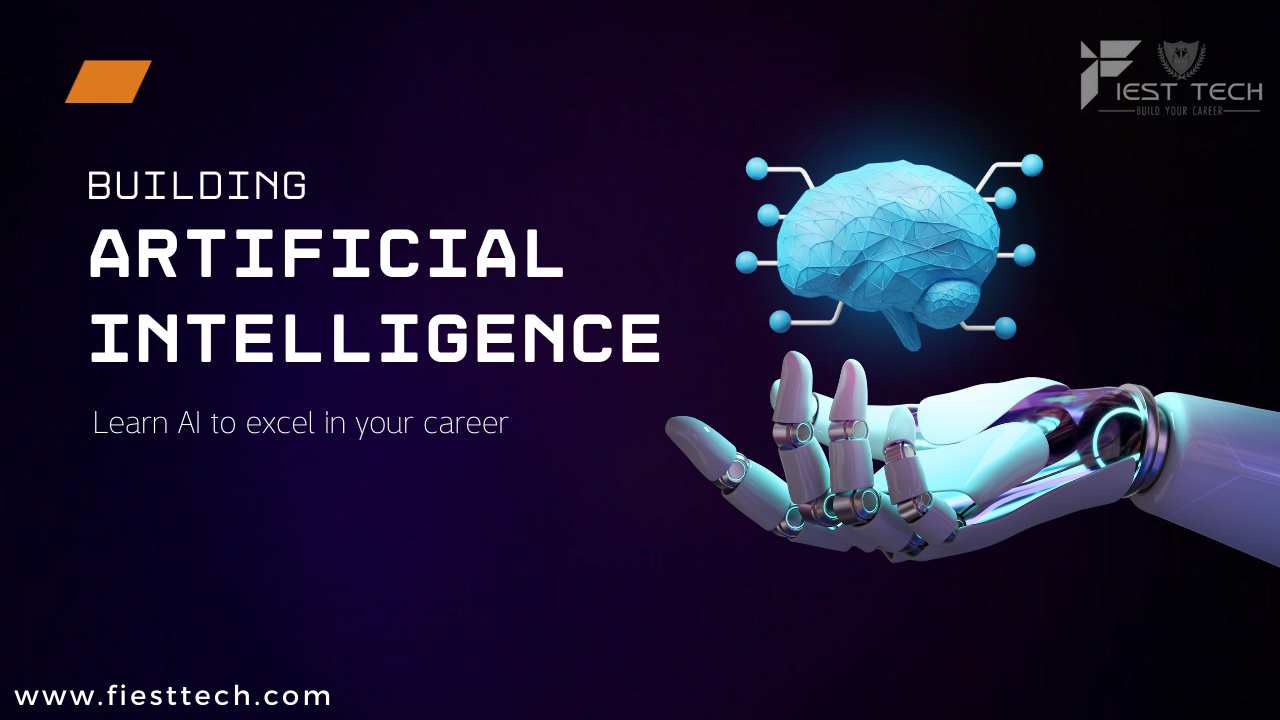Machine Learning Course Overview
This Machine Learning course offers an in-depth overview of Machine Learning topics including working with real-time data, developing algorithms using supervised & unsupervised learning, regression, classification, and time series modeling. Learn how to use Python in this Machine Learning certification training to draw predictions from data.
The Executive Programme in Machine Learning, provides a cutting-edge curriculum designed with an emphasis on the tools and techniques used for handling, managing, analysing and interpreting data and applying them on real-time business use cases. This intensive six-month programme is delivered via engaging live online sessions and a three-day on-campus immersion at the campus.
Machine Learning Key Features
At Fiesttech, we value the trust of our patrons immensely. But, if you feel that this Machine Learning does not meet your expectations, we offer a 7-day money-back guarantee. Just send us a refund request via email within 7 days of purchase and we will refund 100% of your payment, no questions asked!
- 58 hours of Applied Learning
- Gain expertise with 25+ hands-on exercises
- 4 real-life industry projects with integrated labs
- Dedicated mentoring sessions from industry experts
- Data-driven, real-time, day-to-day organizational decisions
- Skills to implement machine learning algorithms
Skills Covered
- Supervised and unsupervised learning
- Time series modeling
- Linear and logistic regression
- Kernel SVM
- KMeans clustering
- Naive Bayes
- Decision tree
- Random forest classifiers
- Boosting and Bagging techniques
- Deep Learning fundamentals
Benefits
Your career in machine learning, and the chances are you will be able to use linear algebra, calculus, probability, and statistics in your daily work. Since machine learning focuses on computers, data and optimizing their performance, computer programming is an essential skill to master machine learning. The Machine Learning market is expected to reach USD $32.64 Billion by 2024, at a growth rate of 44.5%, indicating the increased adoption of Machine Learning among companies. By 2024, the demand for Machine Learning engineers is expected to grow by 11-percent. So this qualifies to be the best skill to learn in 2022 and take the career growth you deserve.
Annual Salary
Hiring Companies

Annual Salary
Hiring Companies
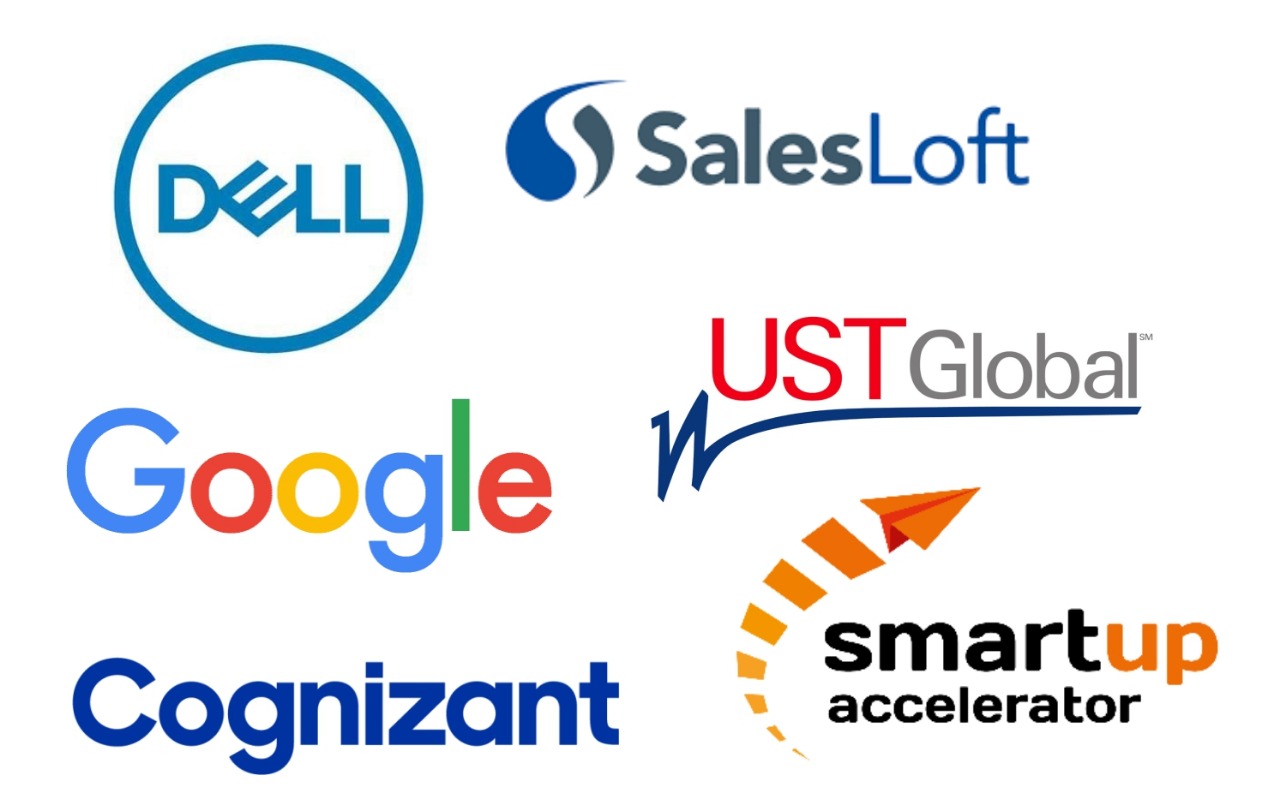
Annual Salary
Hiring Companies
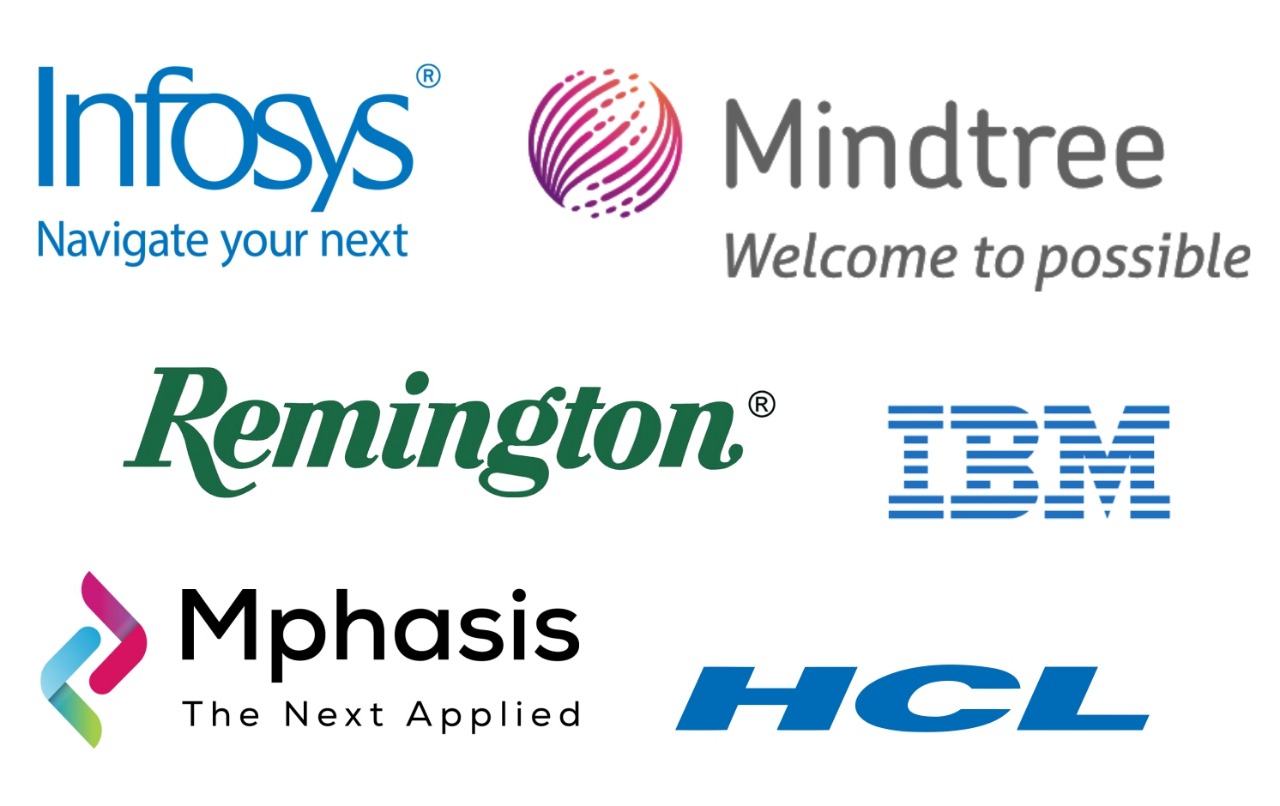
Annual Salary
Hiring Companies
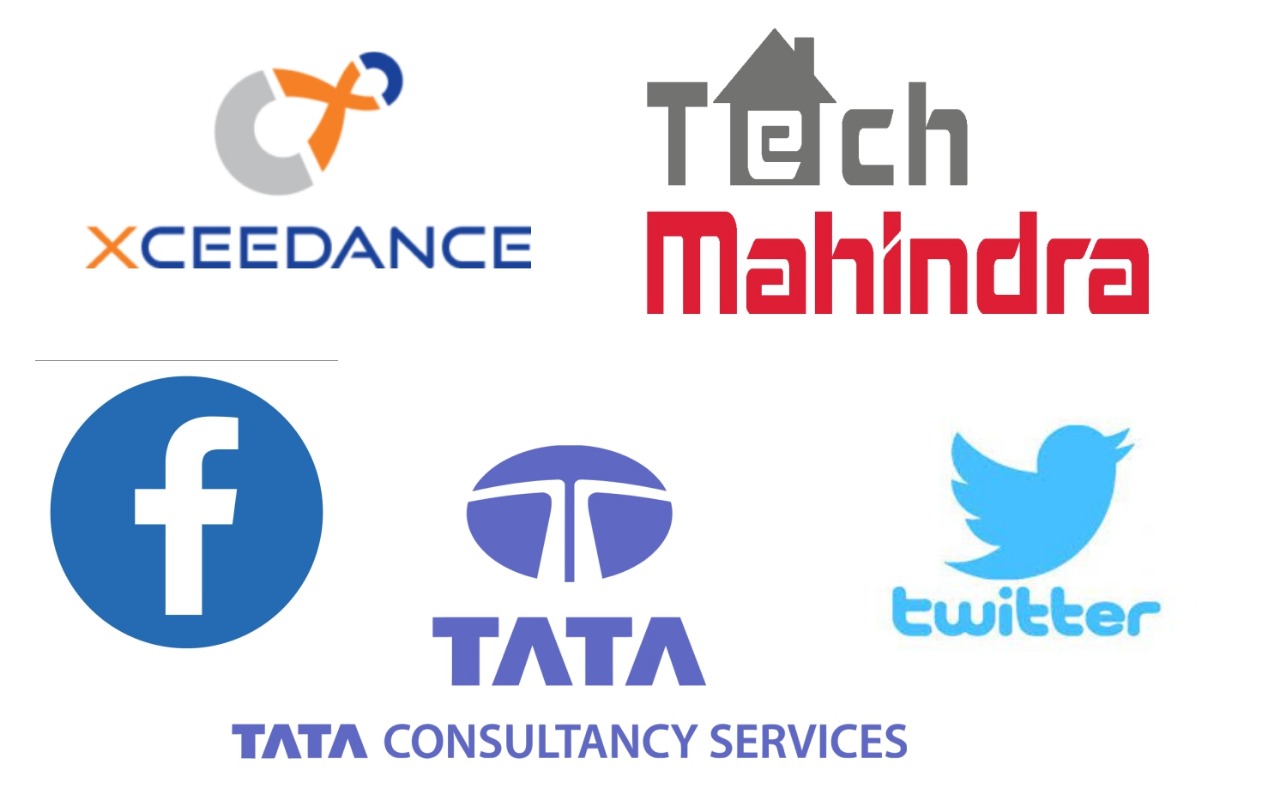
GO AT YOUR OWN PACE
Training Options
Explore all of our training options and pick your suitable ones to enroll and start learning with us! We ensure that you will never regret it!
APPLY
Who Can Apply
- Engineering Students and Recently Graduate Candidates
- Software Developers
- Business Analysts
- Automation Engineers
- Solution Architects
- Quality Analysts
- Project Managers
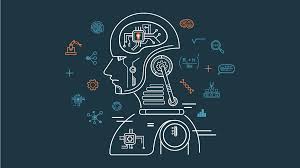
Machine Learning Course Curriculum
Eligibility
The Machine Learning certification course is well-suited for participants at the intermediate level including, Analytics Managers, Business Analysts, Information Architects, Developers looking to become Machine Learning Engineers or Data Scientists, and graduates seeking a career in Data Science and Machine Learning.
Pre-requisites
This Machine Learning course requires an understanding of basic statistics and mathematics at the college level. Familiarity with Python programming is also beneficial. Before getting into the Machine Learning certification training, you should understand these fundamental courses, including Python for Data Science, Math Refresher, and Statistics Essential for Data Science.
Course Content
Live Course
Self Paced
-
2.01 - 2.1 Learning Objectives
01:12 -
2.02 - 2.2 Emergence of Artificial Intelligence
03:23 -
2.03 - 2.3 Artificial Intelligence in Practice
02:11 -
2.04 - 2.4 Sci-Fi Movies with the Concept of AI
03:32 -
2.05 - 2.5 Recommender Systems
01:34 -
2.06 - 2.6 Relationship between Artificial Intelligence, Machine Learning, and Data Science: Part A
02:32 -
2.07 - 2.7 Relationship between Artificial Intelligence, Machine Learning, and Data Science: Part B
01:12 -
2.08 - 2.9 Machine Learning Approaches
00:54 -
2.09 - 2.10 Machine Learning Techniques
03:32 -
2.10 - 2.11 Applications of Machine Learning: Part A
01:21 -
2.11 - 2.12 Applications of Machine Learning: Part B
00:54 -
2.12 - 2.13 Key Takeaways
00:25 -
2.13 - Knowledge Check
01:12 -
2.14 - 2.8 Definition and Features of Machine Learning
02:45
-
3.01 - 3.1 Learning Objectives
00:43 -
3.02 - 3.2 Data Exploration Loading Files: Part A
02:32 -
3.03 - 3.2 Data Exploration Loading Files: Part B
01:21 -
3.04 - Practice: Automobile Data Exploration - A
09:34 -
3.05 - 3.3 Demo: Importing and Storing Data
04:32 -
3.06 - 3.4 Data Exploration Techniques: Part A
02:32 -
3.07 - 3.5 Data Exploration Techniques: Part B
01:12 -
3.08 - 3.6 Seaborn
03:32 -
3.09 - 3.7 Demo: Correlation Analysis
03:32 -
3.10 - Practice: Automobile Data Exploration - B
02:32 -
3.11 - 3.8 Data Wrangling
01:12 -
3.12 - 3.9 Missing Values in a Dataset
02:11 -
3.13 - 3.10 Outlier Values in a Dataset
00:54 -
3.14 - 3.11 Demo: Outlier and Missing Value Treatment
05:56 -
3.15 - Practice: Data Exploration - C
12:00 -
3.16 - 3.12 Data Manipulation
03:32 -
3.17 - 3.13 Functionalities of Data Object in Python: Part A
02:21 -
3.18 - 3.14 Functionalities of Data Object in Python: Part B
02:32 -
3.19 - 3.15 Different Types of Joins
01:12 -
3.20 - 3.16 Typecasting
01:32 -
3.21 - 3.17 Demo: Labor Hours Comparison
06:07 -
3.22 - Practice: Data Manipulation
08:08 -
3.23 - 3.18 Key Takeaways
00:43 -
3.24 - Knowledge Check
00:25 -
3.25 - Storing
05:44 -
3.26 - Storing Test Results
02:32
-
4.01 - 4.1 Learning Objectives
00:34 -
4.02 - 4.2 Supervised Learning
02:32 -
4.03 - 4.3 Supervised Learning- Real-Life Scenario
03:32 -
4.04 - 4.4 Understanding the Algorithm
03:32 -
4.05 - 4.5 Supervised Learning Flow
01:12 -
4.06 - 4.6 Types of Supervised Learning: Part A
02:32 -
4.07 - 4.7 Types of Supervised Learning: Part B
03:32 -
4.08 - 4.8 Types of Classification Algorithms
03:31 -
4.09 - 4.9 Types of Regression Algorithms: Part A
01:21 -
4.10 - 4.10 Regression Use Case
04:34 -
4.11 - 4.11 Accuracy Metrics
01:48 -
4.12 - 4.12 Cost Function
01:48 -
4.13 - 4.13 Evaluating Coefficients
03:23 -
4.14 - 4.14 Demo: Linear Regression
08:43 -
4.15 - Practice: Boston Homes - A
09:34 -
4.16 - 4.15 Challenges in Prediction
01:34 -
4.17 - 4.16 Types of Regression Algorithms: Part B
08:43 -
4.18 - 4.17 Demo: Bigmart
23:51 -
4.19 - Practice: Boston Homes - B
06:07 -
4.20 - 4.18 Logistic Regression: Part A
04:21 -
4.21 - 4.19 Logistic Regression: Part B
03:23 -
4.22 - 4.20 Sigmoid Probability
02:43 -
4.23 - 4.21 Accuracy Matrix
02:35 -
4.24 - 4.22 Demo: Survival of Titanic Passengers
05:25 -
4.25 - Practice: Iris Species
09:09 -
4.26 - 4.23 Key Takeaways
00:46 -
4.27 - Knowledge Check
00:46 -
4.28 - Health Insurance Cost
09:21
-
5.01 - 5.1 Learning Objectives
01:12 -
5.02 - 5.2 Feature Selection
01:21 -
5.03 - 5.3 Regression
01:34 -
5.04 - 5.4 Factor Analysis
03:23 -
5.05 - 5.5 Factor Analysis Process
02:11 -
5.06 - 5.6 Principal Component Analysis (PCA)
02:45 -
5.07 - 5.7 First Principal Component
02:11 -
5.08 - 5.8 Eigenvalues and PCA
02:35 -
5.09 - 5.9 Demo: Feature Reduction
07:28 -
5.10 - Practice: PCA Transformation
09:00 -
5.11 - 5.10 Linear Discriminant Analysis
03:43 -
5.12 - 5.11 Maximum Separable Line
03:23 -
5.13 - 5.12 Find Maximum Separable Line
05:56 -
5.14 - 5.13 Demo: Labeled Feature Reduction
04:22 -
5.15 - Practice
09:21 -
5.16 - Practice: LDA Transformation
05:44 -
5.17 - 5.14 Key Takeaways
00:34 -
5.18 - Knowledge Check
00:25 -
5.19 - Simplifying Cancer Treatment
08:43
-
6.01 - 6.1 Learning Objectives
00:43 -
6.02 - 6.2 Overview of Classification
01:34 -
6.03 - 6.3 Classification: A Supervised Learning Algorithm
02:43 -
6.04 - 6.4 Use Cases of Classification
02:11 -
6.05 - 6.5 Classification Algorithms
03:23 -
6.06 - 6.6 Decision Tree Classifier
02.11 -
6.07 - 6.7 Decision Tree Examples
01:32 -
6.08 - 6.8 Decision Tree Formation
01:35 -
6.09 - 6.9 Choosing the Classifier
01:32 -
6.10 - 6.10 Overfitting of Decision Trees
01:34 -
6.11 - 6.11 Random Forest Classifier- Bagging and Bootstrapping
01:12 -
6.12 - 6.12 Decision Tree and Random Forest Classifier
02:45 -
6.13 - 6.13 Performance Measures: Confusion Matrix
04:34 -
6.14 - Performance Measures: Cost Matrix
05:56 -
6.15 - 6.15 Demo: Horse Survival
08:43 -
6.16 - Practice: Loan Risk Analysis
23:51 -
6.17 - 6.16 Naive Bayes Classifier
04:21 -
6.18 - 6.17 Steps to Calculate Posterior Probability: Part A
03:11 -
6.19 - 6.18 Steps to Calculate Posterior Probability: Part B
02:11 -
6.20 - 6.19 Support Vector Machines : Linear Separability
02:43 -
6.21 - 6.20 Support Vector Machines : Classification Margin
01:34 -
6.22 - 6.21 Linear SVM : Mathematical Representation
04:22 -
6.23 - 6.22 Non-linear SVMs
03:31 -
6.24 - 6.23 The Kernel Trick
03:21 -
6.25 - 6.24 Demo: Voice Classification
09:34 -
6.26 - Practice: College Classification
07:28 -
6.27 - 6.25 Key Takeaways
00:25 -
6.28 - Knowledge Check
01:12 -
6.29 - Classify Kinematic Data
06:07
-
7.01 - 7.1 Learning Objectives
00:43 -
7.02 - 7.2 Overview
01:35 -
7.03 - 7.3 Example and Applications of Unsupervised Learning
04:21 -
7.04 - 7.4 Clustering
02:11 -
7.05 - 7.5 Hierarchical Clustering
02:43 -
7.06 - 7.6 Hierarchical Clustering Example
02:32 -
7.07 - 7.7 Demo: Clustering Animals
04:22 -
7.08 - Practice: Customer Segmentation
02:35 -
7.09 - 7.8 K-means Clustering
03:23 -
7.10 - 7.9 Optimal Number of Clusters
01:26 -
7.11 - 7.10 Demo: Cluster Based Incentivization
07:28 -
7.12 - Practice: Image Segmentation
03:31 -
7.13 - 7.11 Key Takeaways
00:32 -
7.14 - Knowledge Check
00:25 -
7.15 - Clustering Image Data
05:44
-
8.01 - 8.1 Learning Objectives
00:25 -
8.02 - 8.2 Overview of Time Series Modeling
02.11 -
8.03 - 8.3 Time Series Pattern Types: Part A
02:35 -
8.04 - 8.4 Time Series Pattern Types: Part B
01:35 -
8.05 - 8.5 White Noise
01:28 -
8.06 - 8.6 Stationarity
02:06 -
8.07 - 8.7 Removal of Non-Stationarity
01:35 -
8.08 - 8.8 Demo: Air Passengers - A
08:08 -
8.09 - Practice: Beer Production - A
24:48 -
8.10 - 8.9 Time Series Models: Part A
03:23 -
8.11 - 8.10 Time Series Models: Part B
02:11 -
8.12 - 8.11 Time Series Models: Part C
01:34 -
8.13 - 8.12 Steps in Time Series Forecasting
02:45 -
8.14 - 8.13 Demo: Air Passengers - B
04:32 -
8.15 - Practice: Beer Production - B
19:46 -
8.16 - 8.14 Key Takeaways
00:34 -
8.17 - Knowledge Check
01:12 -
8.18 - IMF Commodity Price Forecast
03:31
-
9.01 - 9.01 Ensemble Learning
00:43 -
9.02 - 9.2 Overview
01:35 -
9.03 - 9.3 Ensemble Learning Methods: Part A
02.11 -
9.04 - 9.4 Ensemble Learning Methods: Part B
02:32 -
9.05 - 9.5 Working of AdaBoost
03:11 -
9.06 - 9.6 AdaBoost Algorithm and Flowchart
02:11 -
9.07 - 9.7 Gradient Boosting
02:43 -
9.08 - 9.8 XGBoost
03:23 -
9.09 - 9.9 XGBoost Parameters: Part A
01:32 -
9.10 - 9.10 XGBoost Parameters: Part B
02:11 -
9.11 - 9.11 Demo: Pima Indians Diabetes
04:21 -
9.12 - Practice: Linearly Separable Species
09:34 -
9.13 - 9.12 Model Selection
03:11 -
9.14 - 9.13 Common Splitting Strategies
03:23 -
9.15 - 9.14 Demo: Cross Validation
04:21 -
9.16 - Practice: Model Selection
08:08 -
9.17 - 9.15 Key Takeaways
00:25 -
9.18 - Knowledge Check
00:43 -
9.19 - Tuning Classifier Model with XGBoost
01:34
-
10.01 - 10.1 Learning Objectives
00:25 -
10.02 - 10.2 Introduction
01:32 -
10.03 - 10.3 Purposes of Recommender Systems
01:12 -
10.04 - 10.4 Paradigms of Recommender Systems
02:45 -
10.05 - 10.5 Collaborative Filtering: Part A
01:34 -
10.06 - 10.6 Collaborative Filtering: Part B
01:26 -
10.07 - 10.7 Association Rule Mining
01:32 -
10.08 - Association Rule Mining: Market Basket Analysis
04:32 -
10.09 - 10.9 Association Rule Generation: Apriori Algorithm
02.11 -
10.10 - 10.10 Apriori Algorithm Example: Part A
02:45 -
10.11 - 10.11 Apriori Algorithm Example: Part B
02:11 -
10.12 - 10.12 Apriori Algorithm: Rule Selection
03:23 -
10.13 - 10.13 Demo: User-Movie Recommendation Model
04:22 -
10.14 - Practice: Movie-Movie recommendation
06:07 -
10.15 - 10.14 Key Takeaways
00:34 -
10.16 - Knowledge Check
00:46 -
10.17 - Book Rental Recommendation
01:12
-
11.01 - 11.1 Learning Objectives
00:25 -
11.02 - 11.2 Overview of Text Mining
01:34 -
11.03 - 11.3 Significance of Text Mining
01:34 -
11.04 - 11.4 Applications of Text Mining
02:11 -
11.05 - 11.5 Natural Language ToolKit Library
01:12 -
11.06 - 11.6 Text Extraction and Preprocessing: Tokenization
02.11 -
11.07 - 11.7 Text Extraction and Preprocessing: N-grams
01:34 -
11.08 - 11.8 Text Extraction and Preprocessing: Stop Word Removal
02:35 -
11.09 - 11.9 Text Extraction and Preprocessing: Stemming
01:35 -
11.10 - 11.10 Text Extraction and Preprocessing: Lemmatization
02:43 -
11.11 - 11.11 Text Extraction and Preprocessing: POS Tagging
01:35 -
11.12 - 11.12 Text Extraction and Preprocessing: Named Entity Recognition
01:26 -
11.13 - 11.13 NLP Process Workflow
01:12 -
11.14 - 11.14 Demo: Processing Brown Corpus
05:44 -
11.15 - Wiki Corpus
00:34 -
11.16 - 11.15 Structuring Sentences: Syntax
02:11 -
11.17 - 11.16 Rendering Syntax Trees
02:32 -
11.18 - 11.17 Structuring Sentences: Chunking and Chunk Parsing
04:21 -
11.19 - 11.18 NP and VP Chunk and Parser
02:32 -
11.20 - 11.19 Structuring Sentences: Chinking
02.11 -
11.21 - 11.20 Context-Free Grammar (CFG)
01:34 -
11.22 - 11.21 Demo: Structuring Sentences
07:28 -
11.23 - Practice: Airline Sentiment
28:51 -
11.24 - 11.22 Key Takeaways
00:25 -
11.25 - Knowledge Check
00:32 -
11.26 - FIFA World Cup
23:51

Industry Projects
AI & Machine Learning Industry Projects
Machine Learning Exam & Certification
Upon successful completion of the ML course, Fiest Tech will provide you with an industry-recognized course completion certificate which has lifelong validity.
This course will give you a complete overview of Machine Learning methodologies, enough to prepare you to excel in your next role as a Machine Learning Engineer. You will earn Fiest Tech Machine Learning certification that will attest to your new skills and on-the-job expertise. Get familiar with regression, classification, time series modelling, and clustering.
Online Classroom:
- Attend one complete batch of Machine Learning training
- Submit at least one completed project.
Online Self-Learning:
- Complete 85% of the course
- Submit at least one completed project.
Yes, we provide 1 practice test as part of our Machine Learning course to help you prepare for the actual certification exam. You can try this Course to understand the type of tests that are part of the course curriculum.
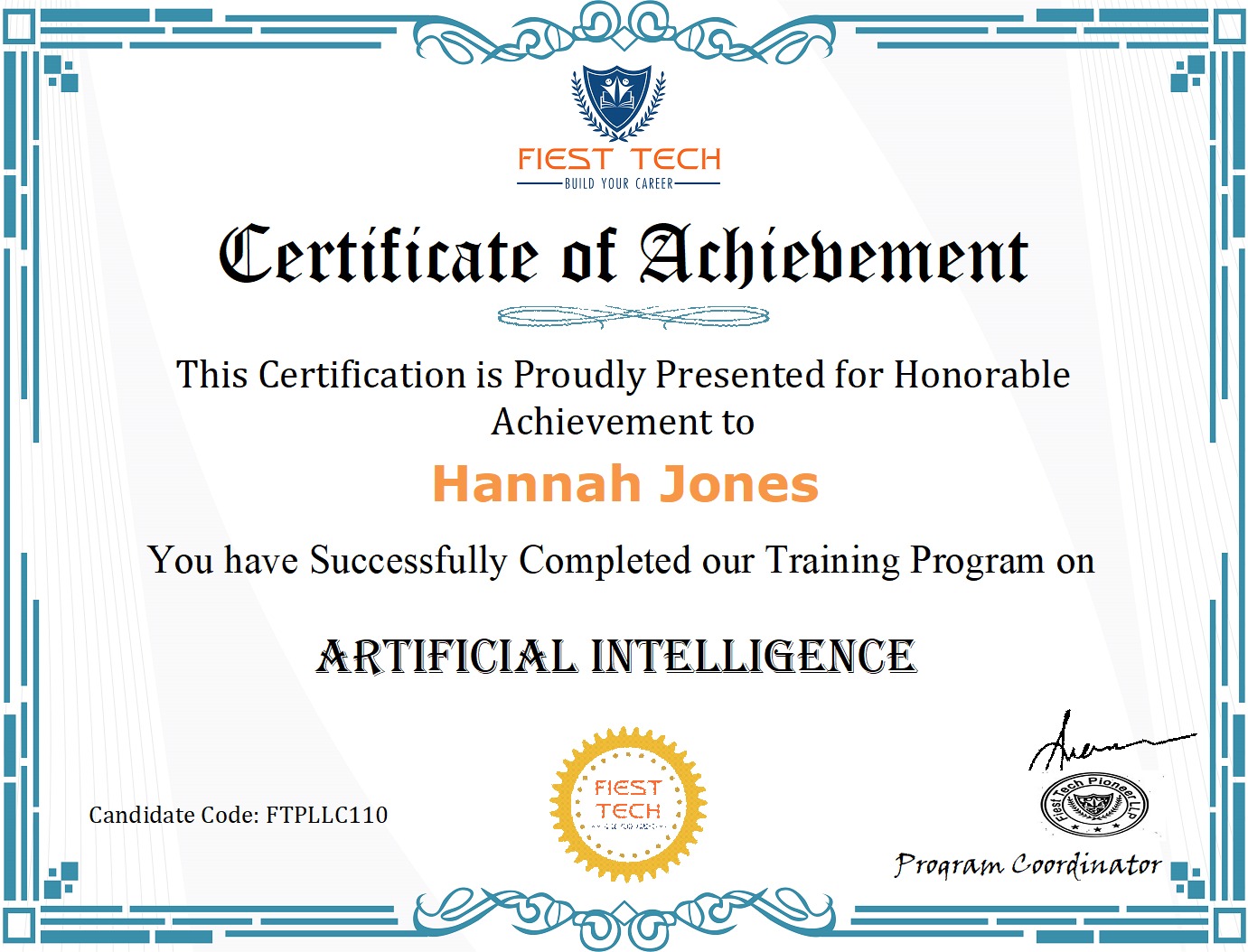
REVIEWS
Machine Learning Course Reviews
Bootcamp
Why Online Bootcamp
Develop skills for real career growth
Cutting-edge curriculum designed in guidance with industry and academia to develop job-ready skills
Develop skills for real career growth
Cutting-edge curriculum designed in guidance with industry and academia to develop job-ready skills
Develop skills for real career growth
Cutting-edge curriculum designed in guidance with industry and academia to develop job-ready skills
Develop skills for real career growth
Cutting-edge curriculum designed in guidance with industry and academia to develop job-ready skills
FAQS
Machine Learning Course FAQs
Machine learning is nothing but an implementation of Artificial Intelligence that allows systems to simultaneously learn and improve from past experiences without the need of being explicitly programmed. It is a process of observing data patterns, collecting relevant information, and making effective decisions for a better future of any organization. Machine learning facilitates the analysis of huge quantities of data, usually delivering faster and accurate results to extract profitable benefits and opportunities.
Machine learning is an application of artificial intelligence (AI) that provides systems the ability to automatically learn and improve from experience without being explicitly programmed. Machine learning focuses on the development of computer programs that can access data and use it to learn for themselves.
Machine learning is generally divided into three types - Supervised Learning, Unsupervised Learning, and Reinforcement Learning. This Machine Learning course gives you an in-depth understanding of all these three types of machine learning.
Yes, some coding knowledge is required to perform certain machine learning tasks like statistical analysis. Basic knowledge of either Python, R, or Java is recommended before taking this Machine Learning certification course.
Machine learning is one of the most in-demand career fields today. Present-day applications like driverless cars, facial recognition, voice assistants, and ecommerce recommendation engines are powered by machine learning. This field will be relevant going forward and professionals entering it can fetch lucrative salaries. As a first step, you can take our machine learning online course and learn everything from scratch.
Machine learning is in high demand. But before you jump into certification training, it’s essential for beginners to get familiar with the basics of machine learning first. Fiest Tech free resources articles, tutorials, and YouTube videos will help you get a handle on the concepts and techniques of machine learning. Start your learning with our free ML courses that serve as a foundation for this exciting and dynamic field: Statistics Essentials for Data Science, Math Refresher, and Data Science with Python.
While taking this machine learning training, you can refer to the following books for a more comprehensive learning experience:
- Machine Learning Yearning by Andrew Ng
- Feature Engineering and Selection: A Practical Approach for Predictive Models by Max Kuhn and Kjell Johnson
- Machine Learning Design Patterns by Valliappa Lakshmanan, Sara Robinson, Michael Munn
- Hands-on Machine Learning by Aurelien Geron
- Pattern Recognition & Machine Learning by Christopher M. Bishop
Industries that use machine learning extensively are transportation, healthcare, finance, agriculture, retail, and customer service. By pursuing the right Machine learning course, you can easily find jobs in these industries and have a highly fulfilling career ahead of you.
Artificial Intelligence is a broad field that encompasses everything that involves giving machines human-like intelligence. Machine learning is an important subset of AI where machines are given a lot of input data and algorithms are applied to train it and give them the ability to ‘learn’ and perform the desired actions. Our ML course deals with this topic in detail.
The roles and responsibilities of Machine Learning Engineers include: Designing and building machine learning systems and schemes Analyzing and processing data science prototypes Performing statistical analysis and modifying models using test results Training ML systems whenever required and enhancing prevailing Machine Learning frameworks and libraries Exploring new data to improve the machine’s performance
Having a Machine Learning certification will help you gain the necessary knowledge and training to shape your career in an AI-led future and deal with machine learning problems.
Machine Learning Engineers take into account various factors to decide which language would best suit their project. Their top choices include Python, C++, R, Java, and JavaScript.
Related Programs
AI & Machine Learning Related Programs


